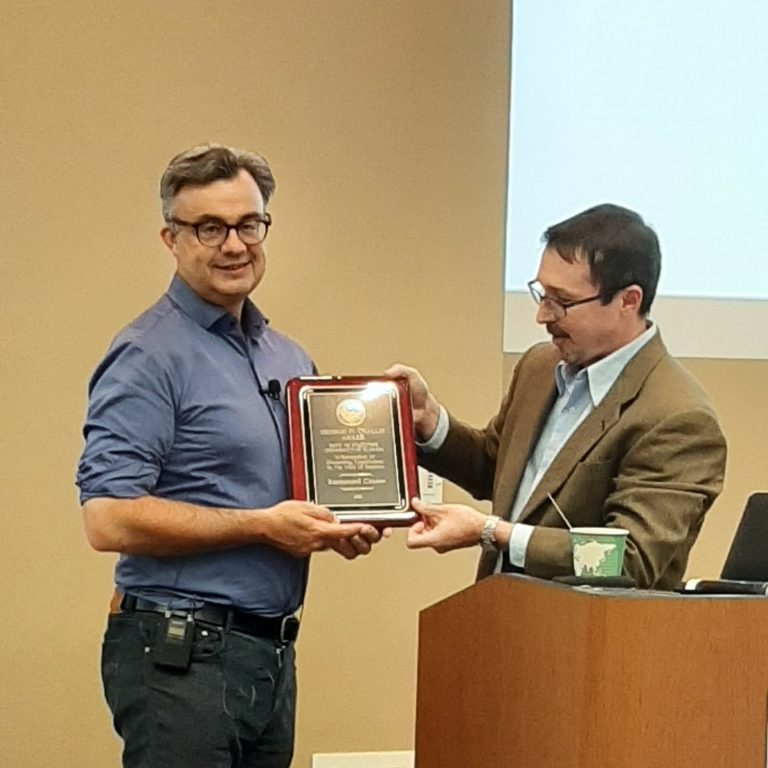Dr. Emmanuel Candés
Professor of Mathematics and Statistics
Stanford University

Emmanuel Candès is the Barnum-Simons Chair in Mathematics and Statistics, professor of electrical engineering (by courtesy), and a member of the Institute of Computational and Mathematical Engineering at Stanford University.
Before arriving at Stanford, Candès was the Ronald and Maxine Linde Professor of Applied and Computational Mathematics at the California Institute of Technology.
His research interests are in computational harmonic analysis, statistics, information theory, signal processing and mathematical optimization with applications to the imaging sciences, scientific computing and inverse problems.
Dr. Candès has received numerous awards including the Alan T. Waterman Award from NSF, which is the highest honor bestowed by the National Science Foundation, and recognizes the achievements of early-career scientists. He has given over 60 plenary lectures at major international conferences, He was elected to the National Academy of Sciences and to the American Academy of Arts and Sciences in 2014.
He received his Ph.D. in statistics from Stanford University in 1998.
General Lecture
Tuesday, April 12, 2022, 4:00PM to 5:00PM
Title:
Sailing Through Data: Discoveries and Mirages
Abstract:
For a long time, science has operated as follows: scientific theory can only be empirically tested, and only after it has been advanced. Predictions are deduced from the theory and compared with the results of decisive experiments so that they can be falsified or corroborated. This principle formulated by Karl Popper and operationalized by Ronald Fisher has guided the development of scientific research and statistics for nearly century. We have, however, entered a new world where large data sets are available prior to the formulation of scientific theories. Researchers mine these data relentlessly in search of new discoveries and it has been observed that we have run into the problem of irreproducibility. Consider the April 23, 2013, Nature editorial: “Over the past year, Nature has published a string of articles that highlight failures in the reliability and reproducibility of published research.” The field of Statistics needs to re-invent itself to adapt to the new reality where scientific hypotheses/theories are generated by data snooping. We will make the case that statistical science is taking on this great challenge and discuss exciting achievements. In particular, we will introduce the method of knockoffs, which reliably selects which of the many potentially explanatory variables of interest (e.g., the absence or not of a mutation) are indeed truly associated with the response under study (e.g., the risk of getting a specific form of cancer). We will see that this line of work opens up new perspectives in applied probability, in scientific computing, and even in deep learning.
Technical Lecture
Wednesday, April 13, 2022, 4:00PM to 5:00PM
Title:
Conformal Prediction in 2022
Abstract:
Recent progress in machine learning provides us with many potentially effective tools to learn from datasets of ever-increasing sizes and make useful predictions. How do we know that these tools can be trusted in critical and highly-sensitive domains? If a learning algorithm predicts the GPA of a prospective college applicant, what guarantees do we have concerning the accuracy of this prediction? How do we know that it is not biased against certain groups of applicants? To address questions of this kind, this talk reviews a wonderful field of research known under the name of conformal inference/prediction, pioneered by Vladimir Vovk and his colleagues 20 years ago. After reviewing some of the basic ideas underlying distribution-free predictive inference, we shall survey recent progress in the field touching upon several issues:
(1) efficiency: how can we provide tighter predictions?
(2) data-reuse: what do we do when data is scarce?
(3) algorithmic fairness: how do we make sure that learned models apply to individuals in an equitable manner?
(4) causal inference: can we predict the counterfactual response to a treatment given that the patient was not treated?